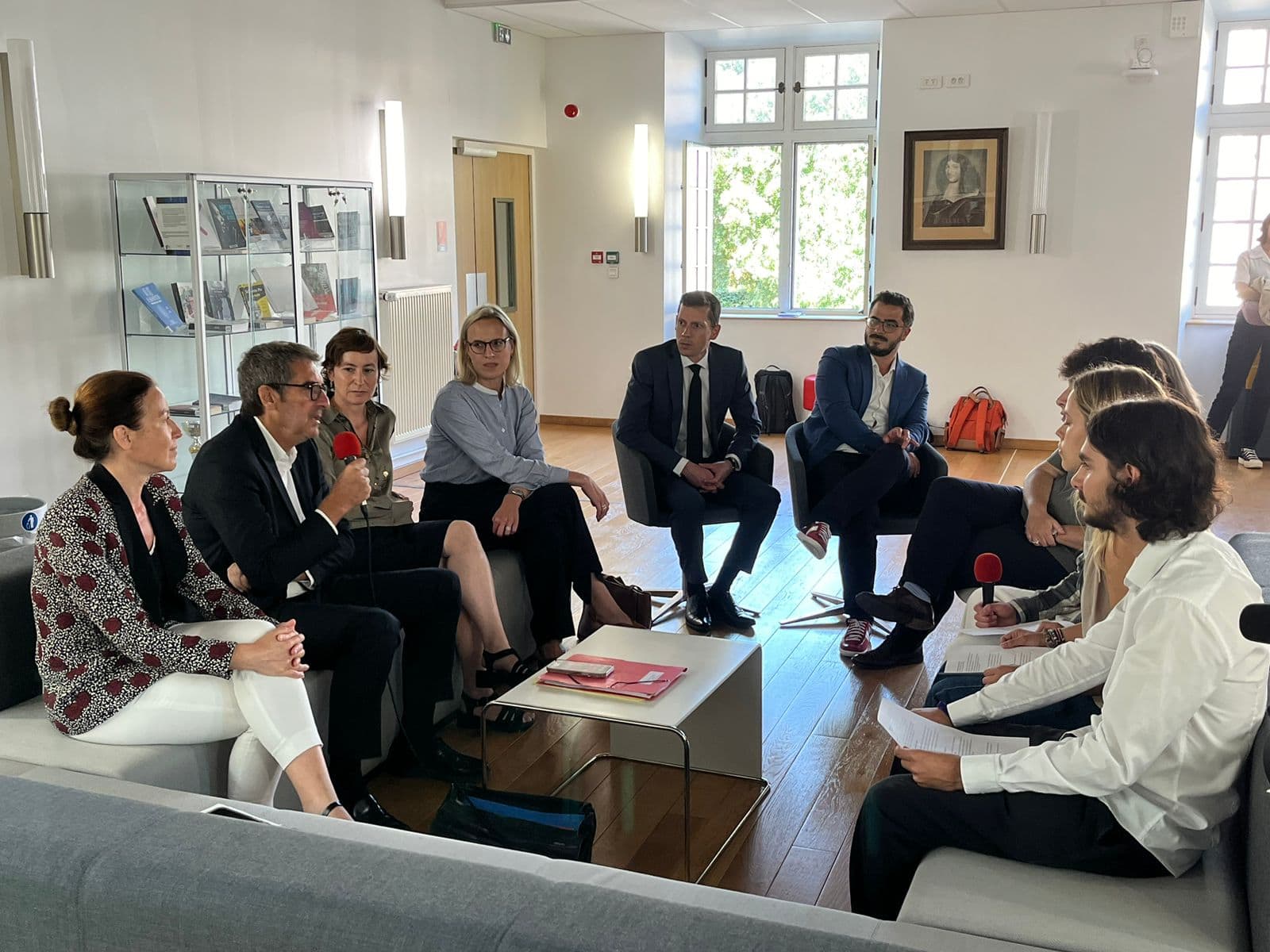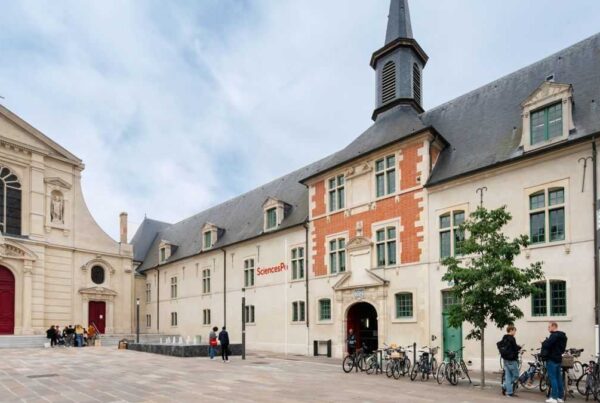In their first interview with student media since the turmoil of last semester, Jean Bassères, Jeanne Lazarus, and Crystal Cordell Paris express their regrets and their desire to find a path forward.
At the end of last semester, the student community on the Reims campus witnessed one of the largest and most disruptive political mobilisations of recent years, including cancelled exams, lengthy student hunger strikes, and police intervention. Now, as integration week comes to a close, the atmosphere on campus has returned to the excitement that welcomes the new year. The opposition could not be greater.
And yet, last Thursday, August 29, that elephant was very much in the room where Jean Bassères, Jeanne Lazarus, and Crystal Cordell Paris took their seats.
Just before addressing the new student cohort gathered for the annual opening ceremony, the interim administrator of Sciences Po, the dean of the undergraduate college, and our campus director, granted local and student press an interview. The school’s leadership was intent on promoting its plans to return to the true “philosophy of university”, a place where reasoned debate and exams constitute the pillars of academic life. However, a look to the past was inevitable.
Jean Bassères: “Calling the police is a failure (…), but if it had to be done again, I would.”
Last May, as the worldwide movement for peace in Palestine spread to France, Sciences Po’s seven campuses found themselves at the heart of the storm. While protests and occupations began peacefully, they soon became the centre of media attention and the response grew increasingly violent in its rhetoric and, at times, its physicality.
Jean Bassères, interim director of the institution, was quick to express his sympathy for the situation in Gaza, and that students were right to be outraged at this “extremely strong shock” to the world. Yet, he could not accept the disruption of exams, which in his view was a “red line” that could not be crossed. Struck by the “radicalisation of the debate” within Sciences Po and in French society, Bassères asserted that students made some “demands that he could not satisfy”, such as publicly acknowledging “the plausible risk” of genocide in Gaza, and investigating the university’s ties to partners in Israel.
For him, Sciences Po’s administration had already engaged in supporting its Palestinian students, as well as researchers and faculty members, although he did not go into details of what such assistance entailed.
Questioned on the lack of discussion with students on the Reims campus, he defended the decision not to hold a town hall outside of Paris, citing “organisational constraints”. Nonetheless, he acknowledged the “natural frustrations of the [Reims] campus representatives”.
However, communication difficulties were not the only flare-up of the pro-Palestinian mobilisations. The intervention of both municipal and national police forces, both at the University of Reims Champagne-Ardenne (URCA) and around the Sciences Po campus, has been a source of contentious debate and one of the main criticisms of the administration’s handling of the crisis.
Jean Bassères considered calling the police and the forced removal of protesters to be a “failure”, and yet, he admitted that “if it had to be done again, [he] would.” In contradiction to this claim, Crystal Cordell, the Reims campus director, maintains that “Sciences Po [Reims] never called the police”, despite the police perimeter around campus on May 13 and 14 for the last exams of the year.
New director: Students can expect “someone who will engage in dialogue with them”.
Despite the breakdown in trust between the administration and students, Jean Bassères remains convinced that last semester’s events will not have “grave consequences” for the institution. To back up his claim, he points to the 9 percent increase in the number of students applying to the undergraduate program through Parcoursup (the domestic university application procedure). However, it remains unclear what the impact of the protests were as those choices were submitted in March, more than a month before the pro-Palestinian movement took shape.
And so, for the leadership of Sciences Po, attention must be turned to the future, starting with the upcoming nomination of a new director of Sciences Po and its governing body, the National Foundation of Political Sciences (FNSP).
While unable to comment on the process itself — which is expected to conclude at the end of September — Interim Director Bassères promised somebody who will engage in dialogue with the student community and carry out ambitious new projects for the school.
Jeanne Lazarus, the dean of the undergraduate college since September 2023, committed to “asking questions in a frank manner” about the institution’s long-lasting practices.
Given the circumstances of the downfall of the two previous directors of Sciences Po, a deep look in the mirror would begin with tackling the ongoing struggles of the institution’s sexual and gender-based violence (SGBV) policies. While recognising the immense progress of the school’s “quality” infrastructure in tackling any case of sexual violence, Jean Bassères insisted that work remains to be done on informing the community of its benefits, and that SGBV policy will “continue to be a priority” for any new director.
Pierre Catalan, the director of student life, also present at the interview, said he wants to continue partnering with student associations working on the matter, believing in the great “complementarity” of their input with the institution’s efforts.
Bassères: We need to re-establish the “ethics of debate”.
A wind of change may well be on its way for our institution, but communication with the student community, particularly unions and representatives, will need to be rebuilt from the ground up.
And this may well start with collaboration on joint projects. Crystal Cordell was keen to underline her sense of “pride” in the efforts made by all 2As, and particularly those in the Bureau des Elèves, to organise integration week. Jeanne Lazarus also celebrated the “wonderful projects” carried out by the entire academic community, stating that success is often outweighed by failure in media coverage.
The plan to move on from last year’s troubles involves furthering the academic analysis of the ongoing Israel-Palestine conflict. Jean Bassères announced that conferences and seminars will be held on the topic, in an effort to reconnect with the “ethics of debate”.
The desire to turn the page on last year’s event is clear on the administration’s part. It cannot be denied that the leadership of the school is taking a diplomatic and cautious approach to the conflict by not simply brushing aside the topic. But their willingness to engage with the student community will have to be tried and tested. Many fractures still need to heal.
The interview of Sciences Po leadership was carried out on Thursday, August 29, 2024 by Sciences Po TV, Reims Campus Broadcasting, and The Sundial Press. Local media were also present. The interviewees were informed of the questions 24 hours in advance.
Other posts that may interest you:
- Dans Le Couteau, Salman Rushdie entre la vie, la mort, et l’amour
- Chien et chat à l’italienne.
- La Reine revit (non, pas celle-là).
- Un phénomène qui se doit d’être vu
- Le SIDA à la télévision : il était temps.
Discover more from The Sundial Press
Subscribe to get the latest posts sent to your email.





